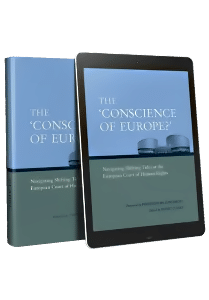
Robert Clarke
LEITER DER WELTWEITEN RECHTSARBEIT
Leiter der weltweiten Rechtsarbeit bei ADF International im Büro in London, Vereinigtes Königreich.
Robert Clarke ist ein führender Menschenrechtsanwalt und dient als Leiter der weltweiten Rechtsarbeit und Stellvertretender Geschäftsführer bei ADF International. Mit Sitz in London leitet er ein globales Team, das auf fünf Kontinenten und in mehr als 100 Ländern an juristischen Strategien arbeitet, um das Recht zu fördern, die Wahrheit zu leben und auszusprechen.
Als zugelassener Barrister (Rechtsanwalt) und Experte für internationales und europäisches Menschenrecht hat Clarke in mehr als 20 wegweisenden Fällen vor dem Europäischen Gerichtshof für Menschenrechte argumentiert oder Stellungnahmen abgegeben. Seine Arbeit umfasst Fälle die Fragen zu Leben und Tod betreffen wie Mortier gegen Belgien, in dem der Gerichtshof Belgien wegen Verstoßes gegen das Recht auf Leben in einem Euthanasiefall verurteilte, sowie wichtige Fälle zur Meinungs-, und Religionsfreiheit wie Tonchev gegen Bulgarien, wo erfolgreich die Diskriminierung einer christlichen Minderheit durch den Staat angefochten wurde.
Bevor Clarke zu ADF International kam, verfolgte er Fälle von schweren medizinischen Fehlverhalten für eine britische Gesundheitsaufsichtsbehörde und praktizierte Straf- und Ordnungsrecht in London. Er ist zur Anwaltschaft in England und Wales zugelassen.
Er berät häufig Gesetzgeber und hat zu Themen wie Meinungsfreiheit, Elternrecht, Religionsfreiheit und der sich wandelnden Menschenrechtslandschaft in Europa und darüber hinaus geschrieben und Vorträge gehalten.
Clarke ist Herausgeber von The ‘Conscience of Europe?’: Navigating Shifting Tides at the European Court of Human Rights (Kairos, 2017) und Mitautor von Religious Beliefs and Conscientious Exemptions in a Liberal State (Hart, 2019).
Er erwarb seinen LLB in Law with American Law an der University of Nottingham mit Auszeichnung und absolvierte ein Jahr an der University of Virginia School of Law. Er ist Blackstone Fellow (2012) und ein Verfechter eines grundsatzorientierten juristischen Engagements in einer sich rasch wandelnden Welt.
Publikationen
The European Court of Human Rights has the monumental task of protecting the most fundamental freedoms of more than 800 million citizens across 47 States. That’s a significant challenge given that the Court is asked to reconcile substantial disagreements between these States on controversial issues—and views on marriage, family, sanctity of life, and religious freedom are far less cohesive now than when the European Convention on Human Rights was drafted. Get one copy here now!



